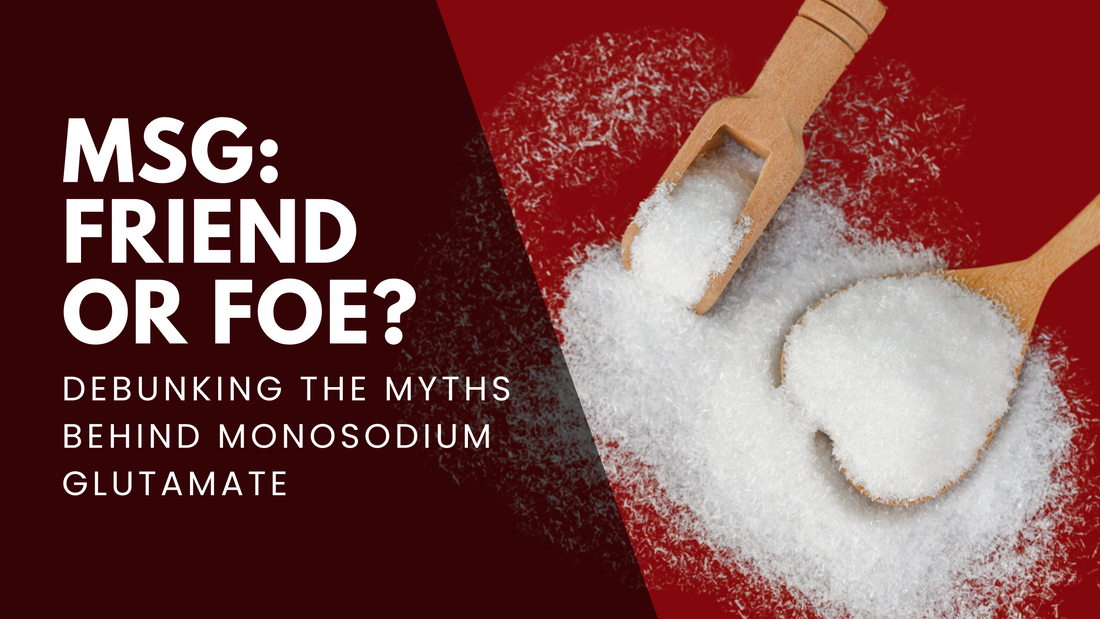
Is MSG Bad for You? Debunking the Myths Behind This Flavour Booster
Melissa da CostaShare
For decades, monosodium glutamate (MSG) has been surrounded by controversy—but is it really harmful? The short answer: No! Despite its reputation, modern science tells a very different story. Let’s explore what MSG actually is, where it comes from, and why it’s completely safe to enjoy.
🌿 What Is MSG?
MSG is a flavour enhancer that brings out the umami taste—the fifth core taste alongside sweet, salty, sour, and bitter. Umami is naturally found in many foods such as tomatoes, mushrooms, cheese, and soy sauce. MSG is simply a purified form of glutamate, an amino acid that occurs naturally in our bodies and in many of the foods we eat every day.
📚 The Myth of “Chinese Restaurant Syndrome”
The misconception that MSG causes health problems dates back to a 1968 letter in a medical journal, where one individual claimed to experience headaches and fatigue after eating at a Chinese restaurant. This became known as “Chinese Restaurant Syndrome.” However, no scientific evidence has ever supported these claims. Numerous studies over the years have debunked the myth, and both the FDA (U.S. Food & Drug Administration) and the World Health Organisation (WHO) have declared MSG safe to consume.
✅ Is MSG Safe?
Yes! Health authorities around the world agree:
- FDA: Recognises MSG as “Generally Recognised As Safe (GRAS).”
- WHO & FAO: Have confirmed MSG’s safety through extensive research.
-
Scientific Reviews: Controlled studies have shown that MSG is not harmful, even in large quantities.

🍜 Ajinomoto: The Original Umami Innovator
MSG as we know it today was first commercialised by Ajinomoto Co., Inc., a leading Japanese food and biotechnology company. Founded in 1909, Ajinomoto was inspired by the work of Japanese chemist Dr. Kikunae Ikeda, who discovered that the savoury taste in seaweed broth came from glutamic acid. Ajinomoto began producing MSG under the name "Ajinomoto", which literally means “essence of taste” in Japanese. Today, the brand not only leads global MSG production but also offers a wide range of seasonings, sauces, frozen foods, and wellness products—bringing umami-rich flavour to kitchens around the world.
🧂 MSG vs. Salt: A Healthier Choice?
Did you know MSG contains two-thirds less sodium than regular table salt? That means you can reduce overall sodium intake in your cooking by using MSG to boost flavour without relying as heavily on salt.
🍜 Why MSG Gets a Bad Rap
Much of the stigma around MSG is rooted in misinformation and cultural bias, especially toward Asian cuisine. It’s worth noting that MSG is widely used in Western snacks, canned soups, seasonings, and fast food—yet it rarely draws the same criticism in these instances.
🥢 Embrace the Umami
So, in summary, MSG isn’t a mystery chemical—it’s a naturally occurring flavour enhancer that helps make food more satisfying. It’s time to ditch the outdated fears and enjoy the umami goodness in your cooking without guilt! (You can easily stock up in our shop!).
It’s time we stop demonising this useful and tasty ingredient. Next time you cook, don’t be afraid to sprinkle a little MSG for that extra flavour kick—science is on your side!
